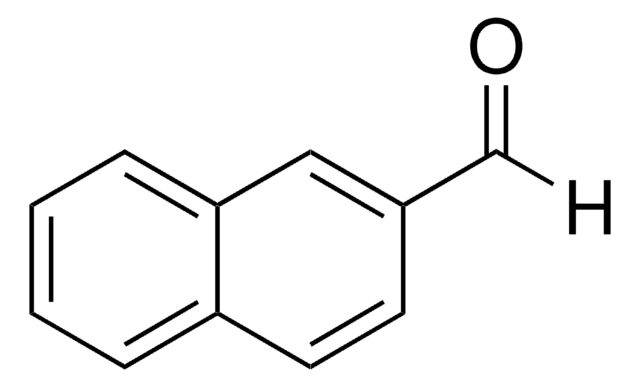70215
2,3-Naphthalenedicarboxaldehyde
suitable for fluorescence
Sinónimos:
NDA
About This Item
Productos recomendados
form
crystals
Quality Level
impurities
≤2% mono- and dicarboxylic acid (1H-NMR)
mp
131-133 °C (lit.)
132-135 °C
fluorescence
λex 420 nm; λem ~480 nm in 0.1 M borate pH 9.3 (after derivatization with glycine [~90 μM glycine, ~20 μM N-])
suitability
suitable for fluorescence
storage temp.
2-8°C
SMILES string
[H]C(=O)c1cc2ccccc2cc1C([H])=O
InChI
1S/C12H8O2/c13-7-11-5-9-3-1-2-4-10(9)6-12(11)8-14/h1-8H
InChI key
ZIPLKLQPLOWLTM-UHFFFAOYSA-N
¿Está buscando productos similares? Visita Guía de comparación de productos
General description
2,3-Naphthalenedicarboxaldehyde is a fluorescent derivatization agent of primary amines, amino acids, and small peptides. The reaction between the amino compounds and NDA results in highly fluorescent and stable derivative compounds.
Application
Features and Benefits
- High Reaction rate.
- High Fluorescence quantum yield.
- No uncommon excitation wavelength.
- No side reactions.
signalword
Warning
hcodes
Hazard Classifications
Eye Irrit. 2 - Skin Irrit. 2 - STOT SE 3
target_organs
Respiratory system
Storage Class
11 - Combustible Solids
wgk_germany
WGK 3
flash_point_f
Not applicable
flash_point_c
Not applicable
ppe
dust mask type N95 (US), Eyeshields, Gloves
Certificados de análisis (COA)
Busque Certificados de análisis (COA) introduciendo el número de lote del producto. Los números de lote se encuentran en la etiqueta del producto después de las palabras «Lot» o «Batch»
¿Ya tiene este producto?
Encuentre la documentación para los productos que ha comprado recientemente en la Biblioteca de documentos.
Los clientes también vieron
Nuestro equipo de científicos tiene experiencia en todas las áreas de investigación: Ciencias de la vida, Ciencia de los materiales, Síntesis química, Cromatografía, Analítica y muchas otras.
Póngase en contacto con el Servicio técnico





![1,8-Diazabiciclo[5.4.0]undec-7-eno 98%](/deepweb/assets/sigmaaldrich/product/structures/120/564/5b373e23-1624-489c-8efb-692de0f96ffb/640/5b373e23-1624-489c-8efb-692de0f96ffb.png)

![1,5,7-Triazabicyclo[4.4.0]dec-5-ene 98%](/deepweb/assets/sigmaaldrich/product/structures/171/446/333d560c-cff6-4958-b489-5acfb3057cce/640/333d560c-cff6-4958-b489-5acfb3057cce.png)






